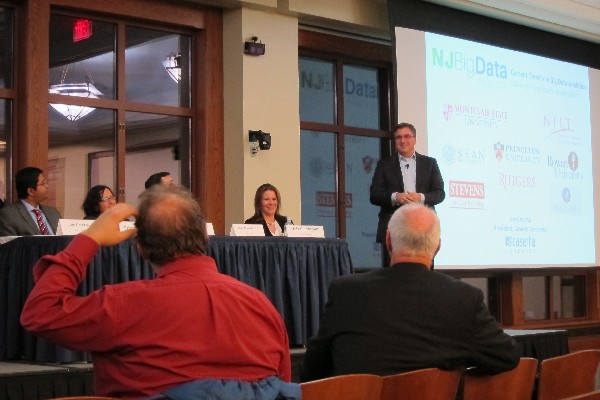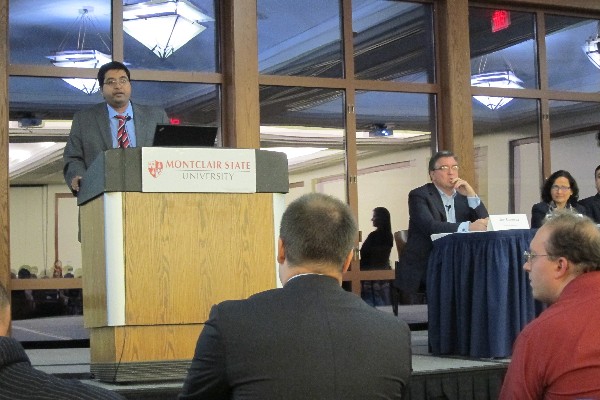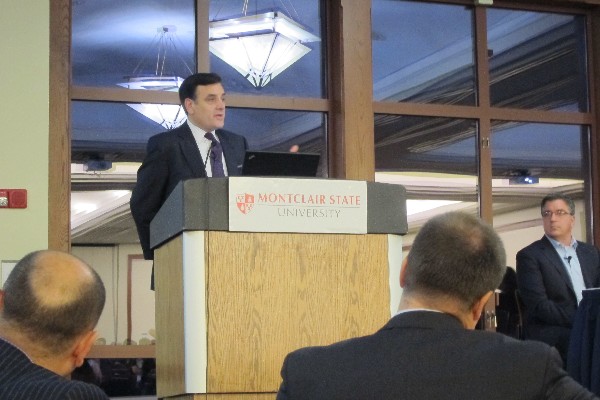Big Opportunities to be Found in Big Data, Say Speakers at Montclair Meetup

“Anybody can learn syntax, but coming up with really creative solutions? That’s what makes you different from everybody else.”
This was said by big data expert Joe Caserta at the Montclair Entrepreneurs meetup group on December 2. During the informative presentations by panelists brought together by the Information & Operations Management Department at Montclair State University’s School of Business, attendees learned that there are a lot of opportunities for entrepreneurs and IT professionals who want to work with big data—as long as they’re clever enough.
“Big data” refers to data sets that are so large, they become difficult to process using traditional methods. These data sets are often analyzed and used for making strategic business decisions. And they’re increasingly common, as Caserta showed Meetup participants.
“I want you to all stand up,” Caserta told audience members. The crowd followed his request, and then he told them to sit back down. Caserta, president and CEO of big data company Caserta Concepts (New York), soon explained the reason for his request.
“Somewhere in the world, somebody knows that you just stood up and you just sat down,” he said. “And I know that because I actually have a client who tracks things like that.”
This demonstration highlighted the pervasiveness of big data collection in modern life. And, despite the privacy concerns that often arise, the widespread use of big data also presents lucrative possibilities for those working in the tech industry.
The attendees learned about these possibilities from presentations by Caserta and three other big data experts, including Steve LoSardo, senior principal at health-care information, service, and tech company IMS Health (Danbury, Conn.); Melanie Murphy, senior director of customer and business analytics at Bed Bath & Beyond (Union); and Arpan Dasgupta, vice president of global consulting for big-data company Fractal Analytics (Jersey City).

Big data has fundamentally changed the business models of corporate giants like Facebook, Walmart and American Express, Dasgupta said. He explained that Amazon, for example, started collecting “more and more” data as it grew.
Amazon originally used consumer data and analytics to provide product recommendations. Before long, executives said “look, we have all the foundational stuff, maybe we can make more money out of it” by expanding data collection and analytics beyond retail, Dasgupta told the crowd.
Once this happened, the company introduced services like Amazon Payments, which uses customers’ data to let them buy products from third-party websites; Amazon Local, which provides discounts based on the user’s location; and Amazon Web Services, which allows users to manage and process large amounts of data.
Other large companies are making similar efforts. “JPMorgan Chase, the largest bank in the world, has built out a completely new team called Intelligent Solutions, whose job is just to figure out ways to monetize its data assets,” Dasgupta said.
In fact, the biggest challenge that companies face when dealing with big data is figuring out what to do with it all that information. “There’s no shortage of data,” at Bed Bath & Beyond, said Murphy. She added that “it’s less about the data and more about what you do with it.”
That means businesses are looking for people with strong strategic and analytical capabilities. But finding workers with the right combination of skills is often challenging. To illustrate this, Murphy referred to a prediction made by information technology research and advisory firm Gartner, Inc., according to which there will be 4.4 million jobs available in big data by 2015. However, only a third of those jobs are expected to be filled, Murphy said.
She added that, in her personal experience, “it’s extremely difficult” to find employees with the right qualifications, especially those who have a mix of analytical skills and business savvy.
Dasgupta said that the need for this skill combination is getting more common. “Increasingly, analytics and business [are] getting integrated,” he said. He later noted that business, marketing and analytic experts are now speaking “the same language.”
This trend has created a lot of opportunities for technology professionals with the right skill set. And, luckily, industries that rely heavily on big data—like health care, telecom and pharmaceuticals—already have a large presence in New Jersey.
There are also “tremendous opportunities” for startups in the health care field, said LoSardo. For example, he said that there is a need for companies that collect health-care data from social media. Additionally, he suggested that entrepreneurs could profit by developing mobile systems to transmit health-care data between doctors and patients who are being treated at home.
He explained that, in health care, working with big data is often about looking at information and “trying to create meaning around it.” For instance, data can be used to predict the results of a patient’s drug regimen, to understand how health-care costs are contributing to a patient’s condition or to evaluate the quality of a patient’s experience.

LoSardo also explained that there is a great deal of convergence “across health care.” The skills that health care providers look for are the same skills needed at pharmaceutical companies and in the insurance industry, he said.
The increasing volume of medical data is illustrated with a prediction made by the Bureau of Labor Statistics, according to LoSardo. The prediction is that there will be a 22% growth in demand for medical records and health-information technicians between 2012 and 2022.

